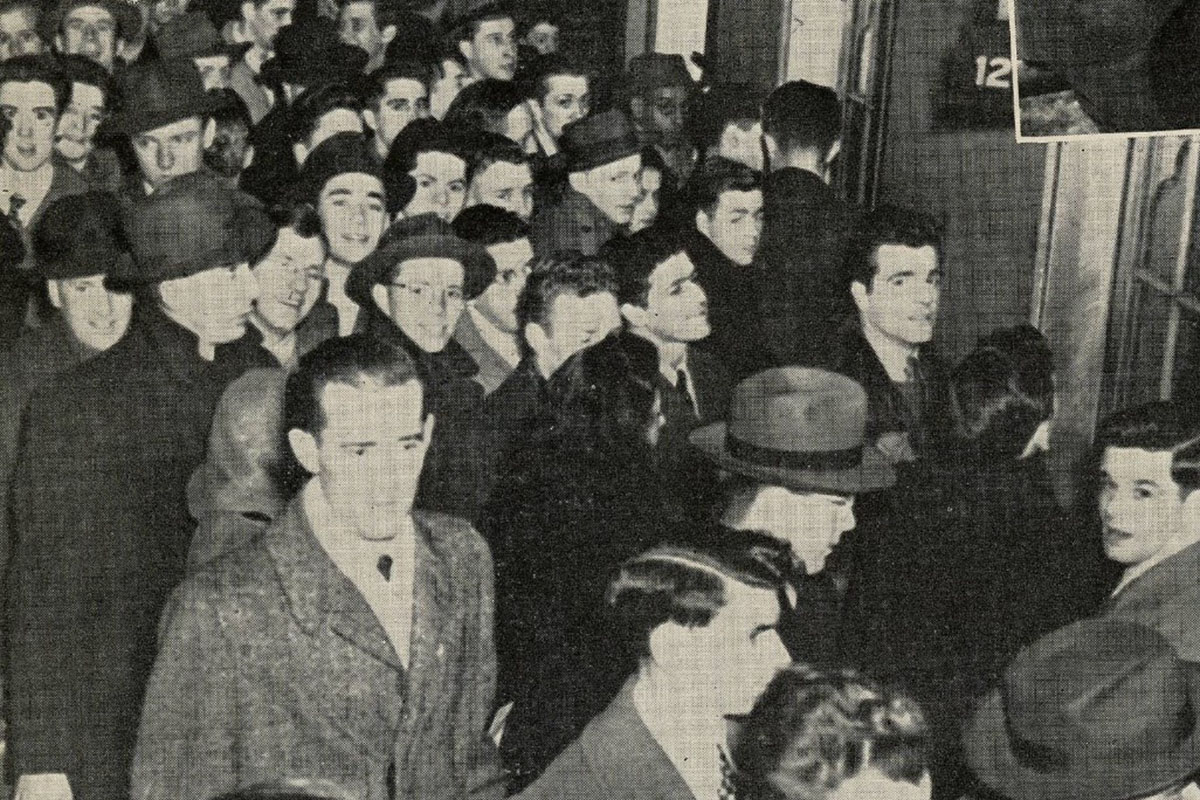 DePaul students wait for the elevators in 1947. (Image courtesy of Special Collections and Archives)
DePaul students wait for the elevators in 1947. (Image courtesy of Special Collections and Archives)
Business and law students returning for classes this fall probably share many of the same concerns with their counterparts of the 1950s and 60s. They worry about their course loads, landing a job after graduation, internships and extracurricular activities. One worry they may not experience to the same magnitude, however, is how much time they should give themselves to wait for the elevator on the way to class. Besides the minor inconvenience of waiting for a few minutes, the elevators of DePaul’s Loop campus buildings probably don’t factor much into students’ daily thoughts at all. For Loop-based students of the mid-20th century, however, the elevators were a major part of their college experience.
Prior to philanthropist Frank J. Lewis
gifting the Kimball Building to DePaul in 1955, DePaul’s downtown campus had been transient, jumping from rented building to rented building. In 1928, the university began renting space in 64 E. Lake St. By the 1950s it was the only building on DePaul’s Loop campus. Housing five schools and executive offices in one building caused major overcrowding problems, resulting in students sitting on floors and classes being held in hallways. The epitome of the overcrowding problem soon became the traffic jams at the building’s elevators.
Nick DeLeonardis, a 1951 graduate of the College of Commerce, summarized the problem very succinctly in his Centennial interview: “People around this place are always complaining about elevators.”
According to various accounts from “The DePaulia,” people had reason to complain. A 1954 article reported, in an effort to be more efficient during rush periods, students would not be able to take the elevator from the 11th floor, home of the College of Commerce, between the hours of 8 a.m. and 2 p.m. Staff and faculty were excused from this ban.
 School of Music students perform as they ride the elevator in Lewis Center in 1963. (Image courtesy of Special Collections and Archives)
School of Music students perform as they ride the elevator in Lewis Center in 1963. (Image courtesy of Special Collections and Archives)
The prominence of the elevators in students’ lives was not due solely to the inconveniences their slowness caused.
“The memory I think a lot of people have is when the elevator stopped on the fifth floor -- the Music School -- you immediately had a blast of pianos, horns and string instruments when the door opened,” recalled alumna Karen Stark in an interview for the DePaul University Alumni Oral Histories. “It was quite a remarkable sound, and you couldn’t wait for the door to close, so you could go right to the quiet of the Business School.”
Stark also noted how interesting having so many different types of schools was, and how communal spaces such as the elevator or the cafeteria allowed these students to spend time together in ways they otherwise may not have.
While the move to Lewis Center in 1958 helped alleviate crowding issues on the elevators, it did not stop the elevator-related hijinks. “The DePaulia” is filled with stories of Louie, the daytime elevator operator, who was charged by writers of the paper with crimes such as yelling at students and over packing people into 64 E. Lake’s revolving door, causing it to jam. Other hijinks recorded include School of Music students putting on jazz performances and a slew of elevator button thefts in the spring of 1960. No motive for the elevator button thefts was ever determined and it appears the culprits were never identified.
While there are still elevators throughout the buildings of DePaul’s Loop campus today, things are not quite the same. DePaul’s student population is much larger, and the Loop campus has long since had to expand to accommodate it. While the elevators may still have busy times, long gone are the days of a lobby packed with more than 100 people waiting for a ride.
One can’t help but look back on the days that alumni like Karen Stark described with a bit of nostalgia, however. Gone are the days where a law student could have a long chat with a music student, or where a person could be greeted with an impromptu concert on the way to class or the office. On the plus side -- at least people around campus aren’t always complaining about elevators anymore.